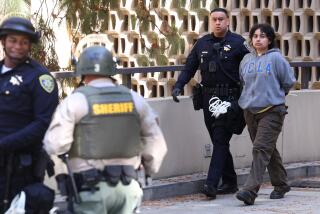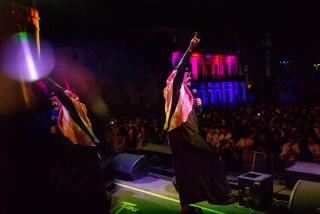In Bahrain, Sunni activist’s plight seen as a cautionary tale
Reporting from Manama, Bahrain — Mohamed Albuflasa was different from everyone else taking the stage on the second day of Bahrain’s protests. He was a Sunni Muslim.
The 34-year-old Salafist favored government reform, and he believed he should speak at the rally to promote unity among the country’s Shiite Muslim majority and Sunnis at Manama’s Pearl Square.
Within hours, a security agency had detained him, and he has not been seen since. Even as hundreds of political prisoners were freed this week by King Hamed ibn Isa Khalifa, Albuflasa remains jailed and his whereabouts a mystery.
“Mohamed’s speech was meant to reduce the fire going on where people create differences between Shiites and Sunnis. He was there to show there is no difference between them. We are all Bahraini,” his brother, Rashid, told The Times this week. “He is not against the royal family and government.”
Bahrain’s popular uprising had been motivated by a wish for democratic reforms, including a stronger parliament and a crackdown on corruption. The goals are shared by all, but the fact that the protests originated from the island’s Shiite majority has frightened many of Bahrain’s Sunnis.
The royal family has played on the Sunni Arab world’s fears of Iran’s Shiite theocracy to hold off on sharing power in Bahrain, analysts and rights activists say.
“The protesters and bloggers over nearly a decade now have made a conscious effort to downplay sectarianism in their rhetoric and demands, focusing on democracy, human rights, accountability, corruption,” said Marc Lynch, the head of the Middle East studies program at George Washington University. “The regime has always tried to play the [Sunni-Shiite] card to delegitimize those demands.”
The ability to divide the population has helped the few thousand-strong-member Khalifa clan preserve its privileged status. Bahrain’s powerful neighbor, Saudi Arabia, has also viewed the state as a bulwark against the spread of Iranian influence. If the Shiites gain greater power in Bahrain, similar demands for reform could be made in the oil-rich Saudi province of Dhahran, which is largely Shiite.
The demonstrations in Pearl Square have been burdened by the history between the two communities: brutal repression of Shiite demonstrations for greater rights over four decades; deep-seated Sunni anxiety over losing power; and searing memories of Islamist Iran’s threat to sow revolution across the Middle East.
Ibrahim Sharif, a Sunni who heads the liberal Waad party and who supports the demonstrations, bemoaned the fact that those shouting slogans against the king in the square are tone-deaf to the Sunni community. He also worried that Saudi Arabia could try to sabotage the mass protest movement.
“In Saudi, there is not one decision maker, there are hundreds who can take matters into their own hands,” Sharif said, adding that he thought the toppling of leaders from Cairo to Tunis had unnerved the two desert kingdoms.
“If [reform] can jump from Tunis to Egypt, then it can jump the Saudi-Bahrain causeway,” he said. He worried that a covert group — whether from Saudi Arabia or Bahrain’s royal family — might try to spark violence and discredit the protest movement, which until now has practiced nonviolence.
Most Sunnis, in reaction to Pearl Square, have now rallied around the government-sanctioned National Unity coalition, headed by the Sunni cleric Sheik Abdel Latif Mahmoud. On Tuesday, the cleric hosted tens of thousands at a pro-government rally.
In his speech that day, Mahmoud made it clear that his followers believed in dialogue and government reforms. But even as he called for conciliatory measures, including the release of political prisoners, others at his rally accused the demonstrators in Pearl Square of wanting to create an Iranian satellite state.
Mahmoud told The Times that such views do not represent his own and urged the sides to sit down and start negotiating. However, he stressed that the king and his family need to stay in control of Bahrain’s political process. “We believe … the government coming from the royal family gives security to both the Shiites and the Sunnis. The royal family are the ones who create a balance,” Mahmoud said.
Despite the tensions, a few Sunnis quietly visit the rallies at Pearl Square. Khadija Hammadi, a television presenter, has been coming to the square because she believes it is the best place to campaign for her rights.
“Most Sunnis want a change in government, but they are afraid about what comes next,” she said.
But the case of Albuflasa is a chilling reminder for those Sunnis who might reach out to the protesters at Pearl Square.
Some pity the fate of the young Bahraini, an Islamist who had run for parliament and won accolades for his nationalist poetry. They see him as someone who delivered a speech at the wrong place at the wrong time.
“Islamist Sunnis historically have supported the government,” said human rights activist Nabeel Rajab. “That’s why they won’t allow this to happen. They will punish him.”
More to Read
Sign up for Essential California
The most important California stories and recommendations in your inbox every morning.
You may occasionally receive promotional content from the Los Angeles Times.










